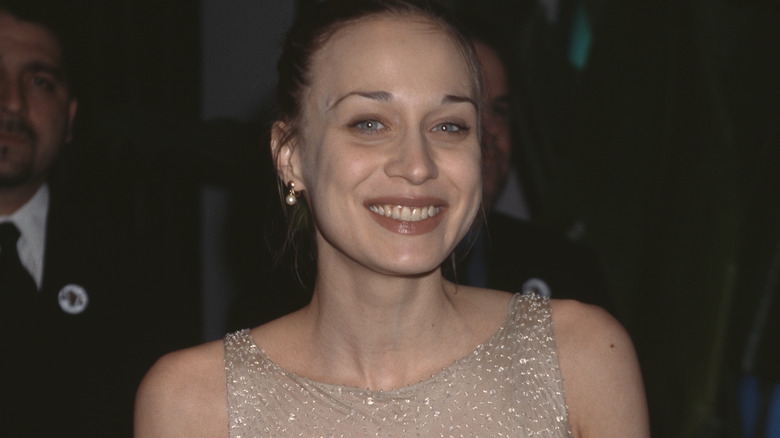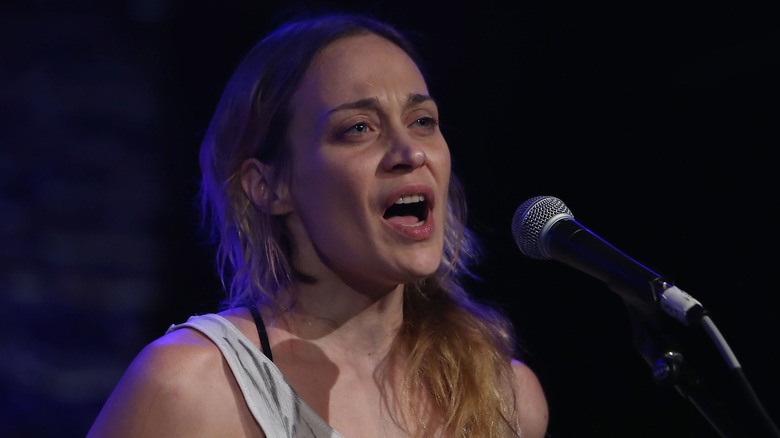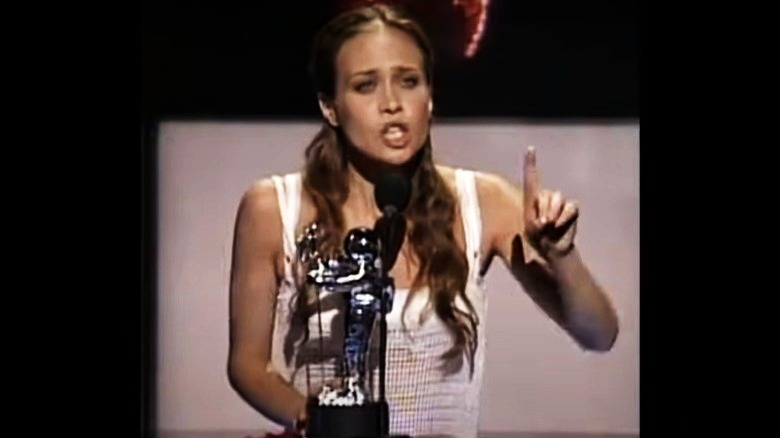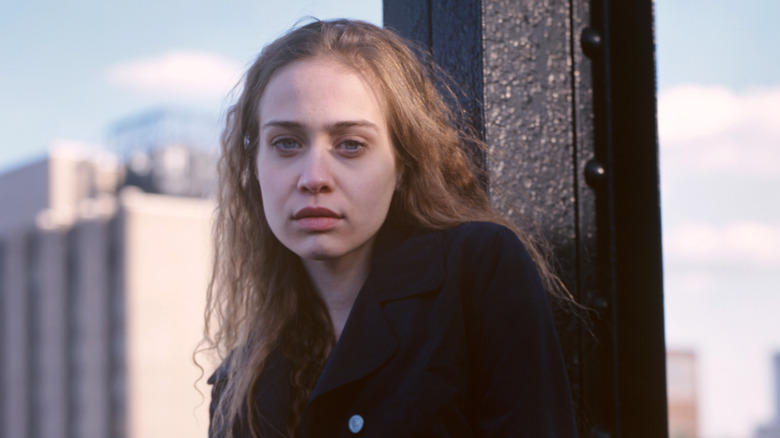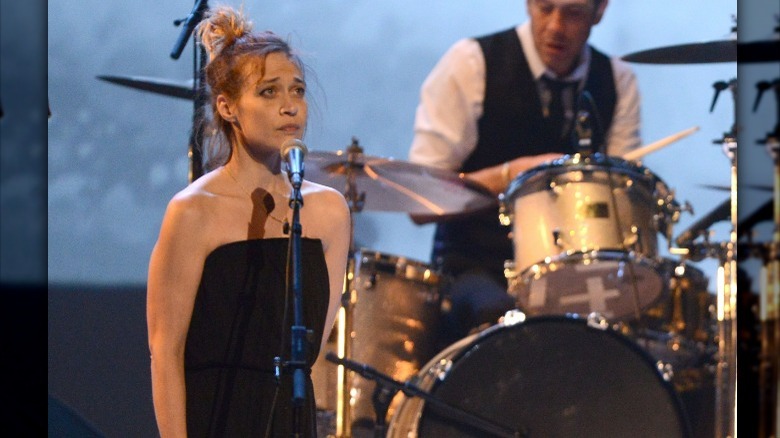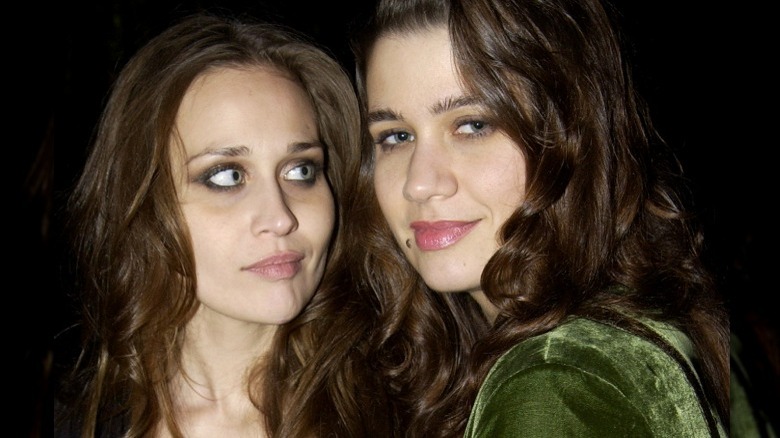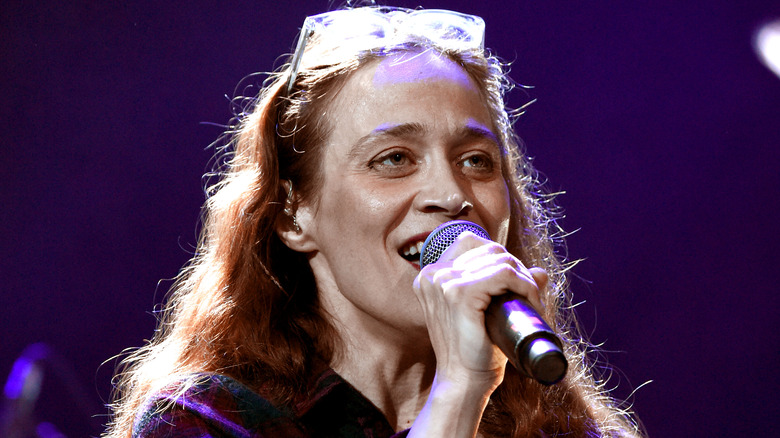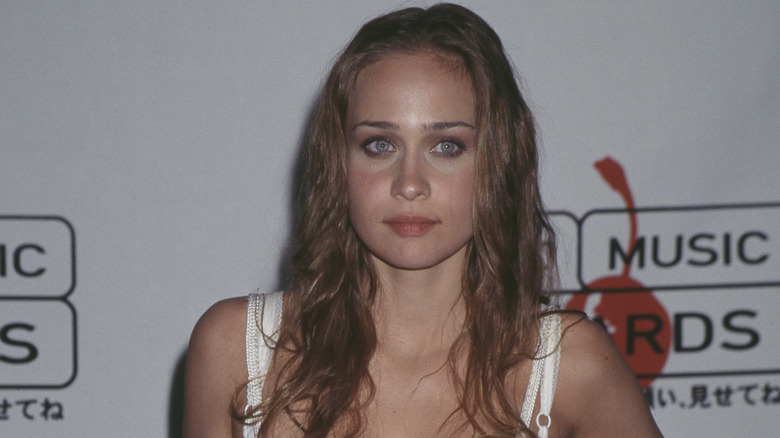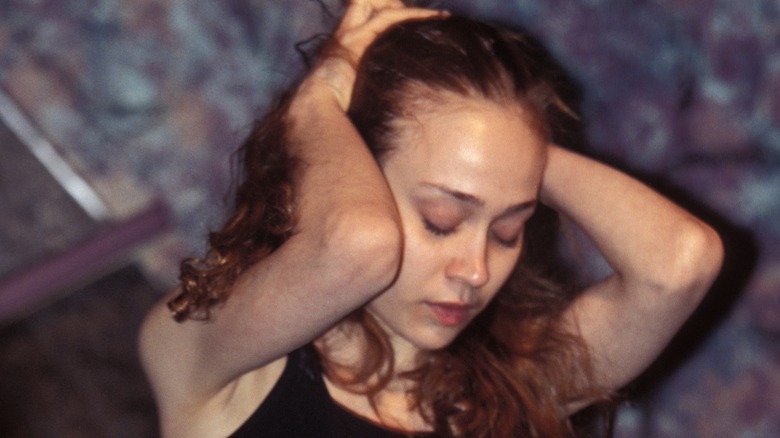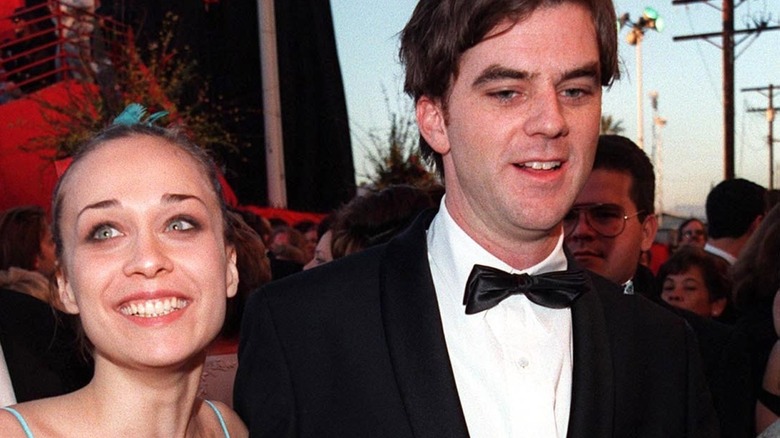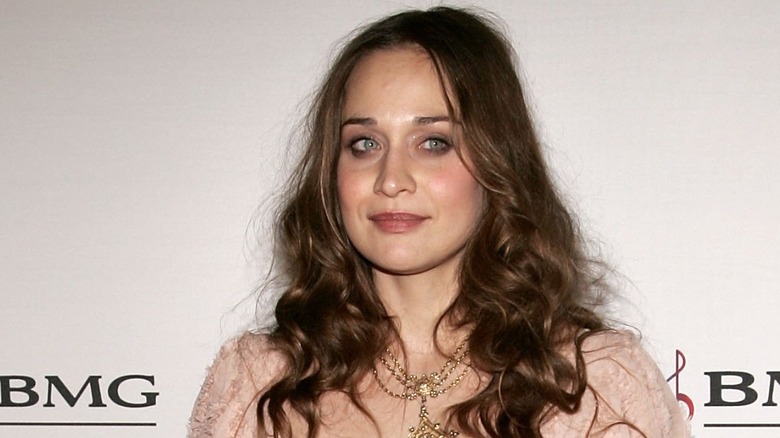The Untold Truth Of Fiona Apple
This article contains descriptions of sexual assault, mental illness, and addiction.
When Fiona Apple first appeared on MTV in the late '90s, the conversation around her was focused mainly on her looks. The video for her hit single, "Criminal" featured the lithe, blue-eyed beauty in various states of undress, frolicking with other young and model-pretty people. In 1997, a Spin magazine profile on the teenage musician proclaimed, "Fiona Apple is a pop star trapped in the body of a pretty teenage girl," but that was a grave underestimation.
Apple is a trained musician and a gifted songwriter who rose to fame and stayed there, not coasting by on her sex appeal, but through the sheer force of her vocals and her intelligent and complex lyricism. Apple garnered legions of devoted fans and continues to stun audiences with pared-down performances where her impassioned delivery takes center stage. Not only is she a powerhouse musician, but she is also brutally honest, politically active, and a survivor of trauma.
During a lull from the photoshoot for the 1997 Spin profile — taken by the controversial Terry Richardson — the "Hot Knife" singer notoriously deflected orders to act sexy and seduce him by repeatedly stating, "There's no hope for women, there's no hope for women." Over the past two decades, she has proven to be much more than just a pop star, and one who has assuredly given hope to women through her thoughtful, defiant music. This is the untold truth of Fiona Apple.
Fiona Apple wanted a different stage name
Fiona Apple McAfee Maggart was born on September 13, 1977, in New York City. During an early-career interview, she explained, "Apple is my middle name and it was my grandmother's last name ... I think." She went on to explain that her full title was too long to use as a stage monicker. When Sony asked her what she'd rather be called, she told them, "Not Fiona Apple, it's too obvious!" While her mom suggested her reclusive daughter call herself Fiona Lone, the burgeoning star instead suggested the name Fiona Maria as a potential idea. "Then six months later, the contract comes — 'Your stage name is Fiona Apple' — and I started laughing," she told Rolling Stone.
While Apple doesn't have social media, she's said to share videos with the fan account, Fiona Apple Rocks, which are uploaded to YouTube and Tumblr. In a video shared with the Fiona Apple Rocks YouTube account, the musician revealed that she had only recently found out the true origin of the "Apple" part of her name during a conversation with her mother. Her dad's grandmother was named Maude Apple, and the musician was led to believe she was named after her. "But I guess my mom just let my dad believe that she was gonna call me Apple after his grandmother," she explained. "... In truth, it was because my mom's best friend had a daughter and gave her daughter the middle name Orange. So, it turns out I'm just named after a fruit."
Her friend's babysitting job led to her eventual fame
Fiona Apple has been playing music since she was a child. "I had been playing piano very, very seriously starting when I was about eleven. I would write scores to chase scenes in National Geographic explorer series," she said during an interview early in her career. She spoke about wanting to leave New York while she was still a teenager to try for a career in music. "I told my sister that I'd heard a voice telling me to go to California and make a demo tape," she shared in another early interview, and so she did just that, making her first batch of 78 demo tapes at her father's prompting. Apple thought the volume of tapes was ridiculous as she didn't want to have to talk to that many different people about her music. It turns out she didn't have to. "I still have 77 of [the demo tapes]," she said.
As Apple told MTV, she gave her first demo to a friend, who babysat for the powerful publicist, Kathryn Schenker. The PR executive then played the tracks at a party where they were heard by the musician's future manager and producer, Andy Slater. "I couldn't believe [the demo] was written and sung by a 17-year-old," he told Billboard in June 1996. "It sounded like a 30-year-old singer who had written a lifetime's worth of material. I thought someone was playing a joke on me." Slater signed Apple to his label and she released her iconic debut album "Tidal."
She doesn't regret her Video Music Awards speech
Fiona Apple's "Tidal" yielded many hit singles, including "Shadowboxer," "Sleep to Dream," and "Criminal." The video for the latter earned her the Best New Artist award at the 1997 MTV Video Music Awards. The honor was well-deserved, but what got the most attention was Apple's acceptance speech. She used her moment to declare, "Everybody out there that's watching this world ... this world is bulls***." She went on to urge viewers not to idolize her or her celebrity peers, but to be true to themselves. While nothing she said was inaccurate, the star was criticized for seeming pretentious and ungrateful.
In a 2019 interview with Spin, Apple said of the incident, "I will never, ever regret what I did. Because I remember sitting in the audience and making the conscious decision that I didn't know what I was gonna say, but that I was going to get my feelings out up there." While she fully stood by what she said in her speech, she compared the experience to having to walk past kids in a high school cafeteria who she knew would only mock her. She refused to feel browbeaten into silence. "[I had] this cool feeling of wanting to take responsibility and make decisions for myself and not feel like I had to hide my emotions — that was a great thing."
Fiona Apple is focused on self-parenting
It shouldn't be seen as a radical statement that Fiona Apple doesn't want children. Radical or not, the musician is not one to bend to society's outdated standards, either way. The artist made the revelation during a 2012 interview with Interview, where she plainly stated, "I've never wanted kids." But just because she doesn't want children, doesn't mean the concept of parenting doesn't interest her. Apple explained, "I do read about parenting a lot. For some reason it's very interesting to me — I think because I'm just big on self-parenting." In fact, while reflecting on her 1997 VMA speech, she mused, "... that was my top moment of self-parenting. No matter if I didn't say it completely right, I said what I wanted to say."
That same year, she confessed to Pitchfork that for a while she'd been considering whether she could ever be a mother. "I wondered if I actually didn't want to, or if I just worried that I wouldn't be able to put their problems in front of mine," she stated. To see if she had the emotional fortitude for raising children, she volunteered at UCLA's occupational therapy ward and worked with children who experienced autism and OCD. Apple recalled that the children would get the most upset while waiting for the elevator. When a co-worker explained, "Transitions are the hardest," she appeared to have her own epiphany, sharing, "I said to myself, 'Transitions are always the hardest.'"
She is a rape survivor
Part of what draws so many to Fiona Apple's music is the raw emotion of her songwriting. Her lyrics tell a story, and sometimes that story can resemble something like a frightening fairytale. For instance, in the 1996 song, "Sullen Girl," the artist sang, "They don't know I used to sail the deep and tranquil sea. But he washed me ashore and he took my pearl — and left an empty shell of me." Per Rolling Stone, when a journalist asked Apple if the song was about a relationship gone wrong, she was honest about its origins — it was actually about the time she was raped at 12 years old.
According to the outlet, Apple was assaulted by a stranger in the hallway of her mother's apartment building on the day before Thanksgiving. The man had a small weapon and told her that if she screamed, he would kill her. Afterward, he wished her a happy Thanksgiving and admonished her not to let strangers in the building. The story is chilling. However, Apple's immediate response to the attack was to pray for the man. She told Vulture, "When I shut the door, I was like, 'That's what you're supposed to do. You have to pray for the people who hurt you.' But you can't stop at praying for them. You have to hold them responsible." She noted that she was finally able to feel anger toward her attacker in 2019 after she got sober.
If you or anyone you know has been a victim of sexual assault, help is available. Visit the Rape, Abuse & Incest National Network website or contact RAINN's National Helpline at 1-800-656-HOPE (4673).
Fiona has experienced multiple mental illnesses
Like many of her peers in the music industry, Fiona Apple has been open about her mental health issues. The singer has spoken about her experiences with depression, PTSD, and OCD, and she uses her incredible songwriting ability to express what these afflictions feel like. That's clear in a song like "Heavy Balloon" from 2020, in which sang, "We get dragged down, down to the same spot enough times in a row, the bottom begins to feel like the only safe place that you know." As she explained to The New Yorker about one aspect of her mental ailments, "It's almost like you get Stockholm syndrome with your own depression — like you're kidnapped by your own depression."
To add to the challenges posed by Apple's diagnoses, she also claimed her treatment was mismanaged. That same year, she told Vulture that she had been prescribed the wrong medications which only complicated matters for her. "I had been put on an antipsychotic. Nobody who is not psychotic should be put on an antipsychotic," she said. Coming off these powerful medications was no walk in the park, either. "I was getting tics, and it was the worst," she recalled. "I woke up one day and I couldn't see — it was double vision from morning until night, and we found out that was a side effect from withdrawal." She told the outlet she has since felt much better, crediting taking the correct medication as well as quitting drinking in 2018.
If you or someone you know needs help with mental health, please contact the Crisis Text Line by texting HOME to 741741, call the National Alliance on Mental Illness helpline at 1-800-950-NAMI (6264), or visit the National Institute of Mental Health website.
She comes from a family of performers
It's no surprise that Fiona Apple got such an early start playing music, as she was born into a musical family. Per The New Yorker, the "Fetch the Bolt Cutters" star is the daughter of the Broadway actor and singer, Diane McAfee, and the actor, Brandon Maggart. The couple met when they were both cast in a Broadway production of "Applause," and they welcomed two daughters together — Apple and her older sister, Amber. They never married and split up when the musician was four, with McAfee staying in New York while Maggart returned to Los Angeles. Both parents remained supportive of Apple and her sister's musical aspirations.
Amber, who performs under the name Maude Maggart, is a cabaret performer who mostly sings jazz standards. She and Apple have always been close and have even collaborated several times, notably on Apple's song "Hot Knife" from her album "The Idler Wheel...." In 2014, the sisters also teamed up to record a cover of Anton Kara's "I'm in the Middle of a Riddle," for a Starbucks Valentine's Day compilation album, per Pitchfork.
She's universally adored by other musicians
Fiona Apple has built a large and devoted fanbase over the course of the past two decades. Naturally, many of those fans are musicians themselves. The "Fast As You Can" star has collaborated with a variety of different artists including the iconic Elvis Costello, and the late great Johnny Cash. She has also lent her vocals to duets with contemporary artists such as Phoebe Bridgers and King Princess.
Apple's raw vocals, brilliant songwriting, and stark, emotional stage presence have earned praise from artists across genres. In 2018, St. Vincent's Annie Clark told the BBC, "She's a true freak of nature. That brain of hers is really something." When the star covered Sharon Van Etten's "Love More," the artist behind the track gushed about Apple in a statement published by Consequence. She shared, "The emotional rawness and visceral angst and honesty of Fiona Apple's music was first met by my teenage years ... She made me want to have something to say."
Meanwhile, during a 2005 conversation between Apple and Kanye West for Interview magazine (via Fiona Apple Rocks), the hip-hop superstar told her that the wordplay and vocal style she exhibited on "Tidal" was a huge influence on his album, "Late Registration." He asked Apple, "How is your vocabulary so ill?" and even suggested he held her talents in even higher regard than those of lyrical legend, Lauryn Hill.
Fiona Apple is a proud advocate for change
Having experienced intense sexual trauma as a pre-teen before being intensely sexualized by the music industry as an older teen, it's understandable that Fiona Apple is a firm vocal champion of women's rights. And that very much seeps into her music, too. As she explained to "Democracy Now!" in 2020, her song "For Her," was inspired by the Brett Kavanaugh Supreme Court hearings. "Victims of sexual assault and sexual abuse will all understand this," she said. "... Sitting there, and watching that man, and knowing that he was going to be on the Supreme Court — it just hurts me down to the marrow."
In a video shared with Fiona Apple Rocks in June 2022, she further criticized the Supreme Court's decision to overturn Roe v. Wade. "It's all about control, it's not about life. It's about control of women, about taking our control of our own bodies away — about taking our autonomy and our privacy and our agency away." She went on to add that she was going to give financial support directly to abortion funds and bail funds, rather than to politicians.
Apple is also an advocate for Indigenous Peoples rights, as well as an animal activist who has made donations to non-profit organizations such as Stand Up For Pits. In 2019, the musician vowed to donate two years' worth of royalties from her song "Criminal" to While They Wait, which helps raise support for immigrants seeking asylum and facing family separation.
The songs she won't play anymore
Fiona Apple has an impressive discography, with some of her earliest hits still in regular rotation on contemporary radio stations. But when she performs live, there are some songs that have been scraped from the set list. During one of the many videos she has posted to YouTube via Fiona Apple Rocks, Apple answered a fan question about the songs she has personally retired. She listed "Never is a Promise" saying, "I don't want to sing that because I don't want to be back in that place." She also claims she doesn't even know how to play it anymore.
Apple went on to explain that she does not play the song "Jonathan" anymore as it was for a specific person – her ex-boyfriend, the author Jonathan Ames, with whom she still has a close friendship. Though she added that she still loves the man behind the track, she isn't comfortable with singing it anymore. Understandably, the musician also listed "Hot Knife" as a song she won't play live due to the complexity of its arrangement. The track features a complex layering of her and her sister's vocals which would be difficult to recreate on stage.
Her lifestyle doesn't reflect her net worth
Fiona Apple started out in the music business as a teenager and continues making music two decades later. However, Apple has been known to take her time between album releases. Since 1996, she has released five studio albums, the first of which, "Tidal," was certified triple platinum. The others included, "When The Pawn...," "Extraordinary Machine," "The Idler Wheel...," and "Fetch The Bolt Cutters." She has collaborated with countless artists, and in 2014 she wrote the dramatic theme song for Showtime's drama series "The Affair," titled "Container."
Given her long and successful career, Apple has managed to cultivate quite the net worth for herself and was valued a $10 million as of 2022, according to Celebrity Net Worth. Not that she's flash with cash. Apple regularly donates to charitable causes and is not exactly known for living a lavish lifestyle. In a 2020 interview with Pitchfork, the star revealed that she rarely leaves her Venice Beach home, which she shares with her best friend and their two dogs — and where she wrote and recorded the album, "Fetch the Bolt Cutters."
However, that same year, Apple told Vulture that while cultivating a safe, comfortable space at home for herself was helpful for her mental health and sobriety, she was excited to challenge herself and move forward. "I love being in my house, but I'm not going to stay here out of fear anymore," she commented.
She has some (in)famous exes
Since Fiona Apple has been in the spotlight for her entire adult life, it stands to reason that she would find love with partners who were also accustomed to a certain degree of fame. Not all of these relationships ended well, and many of the musician's exes became the subjects of her songs. In the '90s, Apple met magician David Blaine and the two dated for just about a year. The pair split amicably and stayed friendly, although Apple was disturbed to learn Blaine had been listed in Jeffrey Epstein's black book, per The New Yorker.
The star went on to date Paul Thomas Anderson, the director of esteemed films such as "Boogie Nights" and "The Master." As Apple detailed to The New Yorker, the couple had a somewhat tumultuous relationship, with the performer alleging that her ex could be cruel and had quite the temper. A little over a decade since their breakup, the filmmaker directed the music video for "Hot Knife." Anderson is now in a long-term partnership with Maya Rudolph with whom he has four children.
Apple also briefly dated the comedian Louis C.K., who was later accused of sexual harassment by multiple women. She shared her dismay over his unwillingness to appropriately consider his behavior and apologize for his actions, telling The New Yorker, "I shake when I have to think and write about myself. It's scary to go there but I go there. He is so weak."
She found peace through meditation
Fiona Apple has long been dealing with the turbulence in her life by practicing meditation. Speaking to Pitchfork, she revealed that when she began, it was difficult because of the intrusive thoughts brought on by her OCD. Thankfully, she learned to simply observe the thoughts and let them go, which is a fundamental part of most meditative practices. "When you're in that [meditative] space of just observing yourself and observing things as nonjudgmentally as you can, you feel more capable of handling it all, more capable of sorting it all out," she explained. "And I think that definitely helps with understanding yourself and with communicating, and so therefore with songwriting."
And that must be true, as Apple credits meditation for inspiring the song "I Want You To Love Me" from "Fetch The Bolt Cutters." She told NPR that the track was formed from an experience she had at a meditation retreat. "It was after six days of meditation ... It sounds crazy, but I had this throbbing in my head, and then at a certain point, it left my head and it became this pulse that everybody shared." It seems as though Apple has found peace and inspiration through her meditation, but she is not the only one benefiting from it — fans are blessed and lucky to get to experience that pulse through her music too.
If you or someone you know needs help with mental health, please contact the Crisis Text Line by texting HOME to 741741, call the National Alliance on Mental Illness helpline at 1-800-950-NAMI (6264), or visit the National Institute of Mental Health website.


